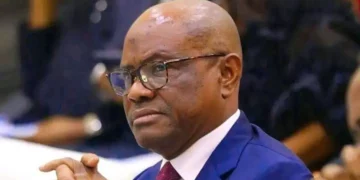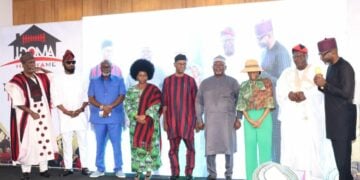Governor of Zamfara State Dauda Lawal has flayed negotiations with armed groups insisting that such encourages violence and weakens state sovereignty.
Lawal spoke in Abuja at the National Institute for Security Studies, where he served as a guest lecturer at the Executive Intelligence Management Course (EIMC) 18.
Governor Lawal, who spoke on “Non-state Actors in Security Management: Issues, Challenges, and Prospects for Peace and Development in Africa – A Zamfara State Perspective”, condemned the ongoing unregulated peace efforts with violent non-state actors in parts of the North-West.
“Dialogue can aid conflict management, but true peace requires disarmament, and reconciliation without control equates to surrender”, he added, “peace efforts should be strong, coordinated, state-led, and backed by legitimate authority.”
Lawal emphasised the need for the state to demonstrate its capacity and willingness to enforce peace, noting “Sustainable peace arises when armed actors acknowledge the rule of law and the Government’s commitment to protect its citizens.”
Governor Lawal stated that the event offered an opportunity to reflect on the Zamfara experience, which, in many ways, parallels the broader local, national, and continental struggles for peace, stability, and development.
“Over the past two decades, Africa’s security landscape has changed beyond traditional definitions. The idea that the state has exclusive control over the use of force is being increasingly challenged by a variety of non-state actors. These include community vigilantes, civil defense groups, insurgents, bandits, and transnational criminal networks.
“Zamfara State’s security challenges stem from years of grievances, economic issues, competition for resources, and climate change. Factors such as the spread of small arms due to regional conflicts, weakened traditional authority, inadequate law enforcement, and rising youth unemployment have exacerbated the situation.
“When we assumed office in 2023, it was made very clear that the security of life and property remains the essence of the modern state system and thus no price is too high to pay. Yet, effective security management cannot succeed without the active participation of the local community. Our strategy, therefore, has been anchored on three mutually reinforcing pillars.”
Governor Lawal listed efforts to boost security in the state to include improved coordination among security agencies through a unified State Security Council and the establishment of Community Protection Guards (CPG) to support law enforcement.
He said the state also established peace committees in every local government area, comprising emirs, imams, women, and youth leaders, to mediate conflicts and rebuild trust. The committees collaborated with international partners, focusing on rehabilitation, reintegration, and trauma healing.
The EIMC 18 participants are drawn from agencies vital to Nigeria’s security framework, with their counterparts from Chad, Ghana, Rwanda, Somalia, and Gambia, among other African countries.





